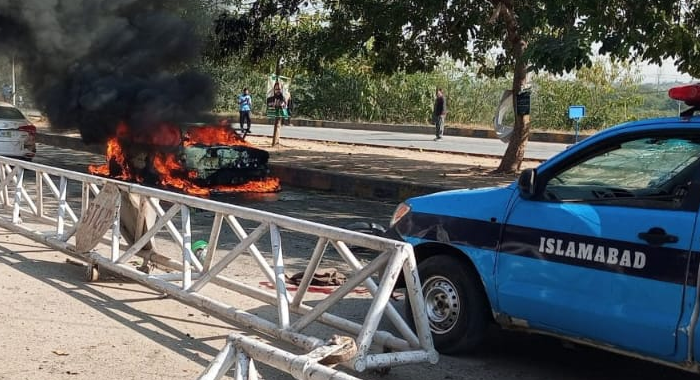The devastating suicide bombing outside Islamabad’s G-11 Judicial Complex on Tuesday afternoon has shaken the federal capital and reignited fears of a return to widespread militancy. The blast, which killed at least 12 people and injured 36 others many critically was the first major suicide attack targeting civilians in the capital in years.
According to police officials, the bomber attempted to enter the court premises but detonated himself at the entrance after failing to breach security. The attack, which bore the hallmarks of previous militant operations, has raised alarm across the region, underscoring Pakistan’s precarious security landscape and its tense relations with neighboring Afghanistan and India.
Reuters described the attack as the first major suicide bombing on civilians in Islamabad after a long period of relative calm. In an immediate response, Defence Minister Khawaja Asif declared that “Pakistan is now in a state of war,” adding that “the message of this blast has come from Kabul, and Pakistan has the full power to respond.”
Interior Minister Mohsin Naqvi, who visited the blast site, stated that the bomber had remained in contact with handlers based in Afghanistan. He warned that “if Afghan authorities fail to restrain these terrorists, Pakistan will have no choice but to act against them itself.”
Islamabad has consistently maintained that the Tehreek-e-Taliban Pakistan (TTP) and other militant outfits operate from Afghan soil with tacit support from India. “These attacks are aimed at spreading fear,” Naqvi said. “One country provides the terrorists with shelter, while another stands firmly behind them.”
The Taliban government in Kabul swiftly condemned the bombing, expressing “deep sorrow” over the loss of lives while categorically rejecting Pakistan’s allegations. “Afghanistan does not allow its soil to be used against any other country,” an Afghan spokesperson said. Meanwhile, India’s Ministry of External Affairs also denied Islamabad’s accusations.
The Islamabad bombing came just a day after a similar explosion in New Delhi killed eight people, intensifying suspicions and adding fuel to already simmering tensions between Pakistan, Afghanistan, and India. Analysts say these back-to-back attacks have heightened the sense of volatility in South Asia, where rival powers are now entangled in a shadow conflict extending beyond conventional battlefields.
Experts believe that the attack signals not just a domestic crisis but also a regional fault line that could spiral into a larger confrontation. The presence of militant groups in Afghanistan and Pakistan’s allegations of Indian involvement have created a combustible mix of mistrust and proxy competition. Pakistan’s security institutions have already declared a high alert nationwide, anticipating further attacks.
The current climate of instability follows months of escalating hostilities. In May, Pakistan and India fought a brief four-day border conflict, followed by Pakistan’s airstrikes inside Afghanistan last month targeting alleged TTP hideouts. The strikes triggered cross-border skirmishes and derailed subsequent peace talks, leaving diplomatic channels frozen.
Retired Lieutenant General Muhammad Saeed described the situation as part of a “coordinated campaign to destabilize Pakistan.” He argued that “terrorists are being supported by one country and given safe haven by another.”
Abdul Basit, a researcher at Singapore’s S. Rajaratnam School of International Studies, viewed the incident as part of a broader pattern of hybrid warfare. “These emerging militant groups are a new tactic by the Afghan Taliban,” he explained. “They want plausible deniability while signaling that if Kabul is attacked, Islamabad will not remain safe either.”
Pakistan today faces the most severe wave of terrorism in more than a decade. The TTP alone has claimed responsibility for over 600 attacks across the country this year, the majority in Khyber Pakhtunkhwa’s border districts, leaving hundreds dead. The Islamabad bombing, however, marks a dangerous escalation bringing the war to the capital once again.
The recent surge in violence exposes how Pakistan’s internal security crisis has once again merged with regional rivalries. The state’s renewed rhetoric of “being at war” is not just a reflection of grief or anger; it is an admission that peace remains elusive as long as militant sanctuaries, cross-border tensions, and proxy politics continue to converge.
For Pakistan, the challenge now lies not only in neutralizing the immediate threat but in navigating a regional environment where every explosion carries the risk of another crisis. The Islamabad attack is, therefore, more than a tragedy it is a warning that South Asia’s fragile peace could unravel faster than anyone expects.





